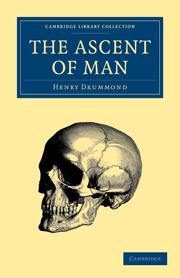Book contents
- Frontmatter
- Preface
- Contents
- THE ASCENT OF MAN
- INTRODUCTION
- CHAPTER I THE ASCENT OF THE BODY
- CHAPTER II THE SCAFFOLDING LEFT IN THE BODY
- CHAPTER III THE ARREST OF THE BODY
- CHAPTER IV THE DAWN OF MIND
- CHAPTER V THE EVOLUTION OF LANGUAGE
- CHAPTER VI THE STRUGGLE FOR LIFE
- CHAPTER VII THE STRUGGLE FOR THE LIFE OF OTHERS
- CHAPTER VIII THE EVOLUTION OF A MOTHER
- CHAPTER IX THE EVOLUTION OF A FATHER
- CHAPTER X INVOLUTION
CHAPTER IX - THE EVOLUTION OF A FATHER
Published online by Cambridge University Press: 05 October 2010
- Frontmatter
- Preface
- Contents
- THE ASCENT OF MAN
- INTRODUCTION
- CHAPTER I THE ASCENT OF THE BODY
- CHAPTER II THE SCAFFOLDING LEFT IN THE BODY
- CHAPTER III THE ARREST OF THE BODY
- CHAPTER IV THE DAWN OF MIND
- CHAPTER V THE EVOLUTION OF LANGUAGE
- CHAPTER VI THE STRUGGLE FOR LIFE
- CHAPTER VII THE STRUGGLE FOR THE LIFE OF OTHERS
- CHAPTER VIII THE EVOLUTION OF A MOTHER
- CHAPTER IX THE EVOLUTION OF A FATHER
- CHAPTER X INVOLUTION
Summary
In last chapter we watched the beautiful experiment of Nature making Mothers. We saw how the young produced at one birth were gradually reduced in numbers until it was possible for affection to concentrate upon a single object; how that object was delayed in birth till it was a likeable and presentable thing; how it was tied to its mother's side by physical bonds, and hindered there for years to give time for the Mother's care to ripen into love. We saw, what was still more instructive, that Nature, when she had laid the train for perfecting these arrangements, gave up making any more animals; and that there were physiological reasons why this well-mothered class should survive beyond all others, and, by sheer physiological fitness, henceforth dominate the world.
But there was still a crowning task to accomplish. The world was now beginning to fill with Mothers, but there were no Fathers. During all this long process the Father has not even been named. Nothing that has been done has touched or concerned him almost in the least degree. He has gone his own way, lived outside all these changes; and while Nature has succeeded in moulding a human Mother and a human child, he still wanders in the forest a savage and unblessed soul.
This time for him, nevertheless, is not lost. In his own way he is also at school, and learning lessons which will one day be equally needed by humanity.
- Type
- Chapter
- Information
- The Ascent of Man , pp. 374 - 407Publisher: Cambridge University PressPrint publication year: 2009First published in: 1894



